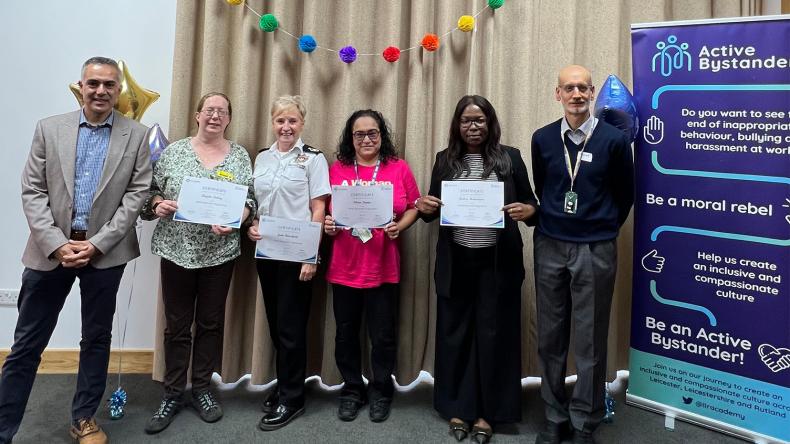Active bystanders: promoting inclusion, civility and respect

Overview
Leicestershire, Leicester and Rutland Integrated Care System (LLR) launched the Active Bystander Programme to address issues of bullying, harassment and discrimination in the workplace. By equipping staff with the knowledge, skills and confidence to intervene when witnessing inappropriate behaviours, the programme fosters a culture of respect, inclusion and psychological safety across the system.
Key benefits and outcomes
- Over 500 staff trained as 'active bystander champions' across LLR and the Midlands.
- Inclusive workshops bring together staff from different organisations, roles and pay bands, creating safe spaces for open discussion and shared learning.
- Encouraging early intervention reduces escalation and impact on individuals, managers and teams.
- Normalised and supported speaking up fosters a culture of respect and accountability where feedback is valued.
- Reported improvements in staff wellbeing and patient care through a more inclusive, psychologically safe environment.
What the organisation faced
The NHS has made important progress in improving workplace culture. But issues such as bullying, harassment and discrimination continue to affect staff across the system.
In 2022, LLR engaged with its workforce to better understand their experiences. Many staff reported that they had either experienced or witnessed harmful behaviours at work. Regardless of their role or level of seniority, many said they did not feel equipped to respond effectively.
These insights highlighted the urgent need for a proactive, system-wide approach to create a safer and more respectful working environment where staff had the tools and confidence to respond when they witnessed inappropriate behaviour.
What the organisation did
LLR created the Active Bystander Programme as a focused organisational development (OD) initiative. With early input from Professor Catherine Sanderson, author of The Bystander Effect (2020), the programme was grounded in evidence-based research, positive psychology and local OD expertise.
The programme offers a range of interventions designed to engage staff at all levels:
- Board development session (90 minutes): introduces senior leaders to the principles of active bystanding.
- Senior leaders module (90 minutes): focuses on creating the conditions for psychological safety.
- Active bystander champions workshop (one day): face-to-face session featuring practical, scenario-based learning, followed by action learning sets.
- Awareness-raising session (90 minutes): designed to reach a broader audience across the system.
A key strength of the programme is its inclusive and collaborative design. Each workshop brings together staff from different organisations, roles and pay bands, creating safe spaces for open discussion and shared learning, encouraging empathy, curiosity and mutual understanding.
The programme promotes a ‘call people in’ approach. Rather than focusing on blame, it encourages constructive conversations that de-escalate situations and support learning for everyone involved — witnesses, those affected and those responsible.
Why active bystanding matters in health and care
Health and care environments are often high pressure and fast paced. For staff to provide safe, high-quality care, they need to feel respected, supported and psychologically safe. But many challenges still exist:
- A significant number of staff report experiencing bullying and harassment, which can damage morale, reduce retention and harm overall wellbeing.
- Systemic bias and unequal treatment continue to affect staff experiences and limit opportunities for career progression.
- When staff don’t feel safe to speak up, it can negatively impact patient safety and organisational performance.
Many of the 500+ active bystander champions across LLR and the Midlands have reported that when they feel empowered to act, their workplace benefits in several ways:
- harmful behaviours are addressed early, preventing escalation
- a culture of mutual respect and accountability becomes the norm
- teams become more open, innovative and cohesive
- patient care and safety improves.
Results and benefits
From an OD perspective, the Active Bystander Programme supports broader strategic goals across system partners. It helps build more resilient, inclusive and adaptable organisations. Key outcomes include:
- Building capability and confidence: staff develop the skills to recognise and respond to inappropriate behaviour through workshops and real-life scenarios.
- Enhancing leadership and accountability: leaders trained in active bystanding become visible role models and drivers of cultural change.
- Advancing EDI: the programme actively challenges bias and discrimination, supporting fairer workplace practices.
- Fostering continuous improvement: encouraging reflection and open dialogue helps create a learning culture where feedback is valued.
- Measuring impact: evaluation frameworks provide staff experience data to guide ongoing improvement.
The programme also complements the wider NHS Inclusive Culture and Leadership Framework and aligns with local NHS People Plan priorities, contributing to meaningful and lasting cultural transformation.

(Colleagues receive Active Bystander Champion certificates at a celebration event in September 2025, presented by Nil Sanganee, chief medical officer at NHS Leicester, Leicestershire and Rutland Integrated Care Board [far left] and Zafar Saleem, assistant chief executive at Leicestershire County Council [far right]. Recipients left to right: Angela Paling, Judi Beresford, Nilam Tanna and Hellen Makamure.)
Overcoming obstacles
Implementing the programme came with various challenges. These included:
- Gaining consistent leadership support across all organisations in the system.
- Ensuring psychological safety of staff during training sessions and workshops.
- Adapting content to suit a wide range of workplace settings, cultures and roles.
Takeaway tips
For organisations looking to introduce or strengthen active bystander initiatives, LLR offers the following practical advice:
- Secure leadership buy-in: involve leaders early and encourage visible participation, change is most effective when it starts at the top.
- Integrate with existing initiatives: align with organisational EDI, wellbeing and leadership development strategies for greater impact.
- Create safe spaces: psychological safety is essential for honest conversations and learning.
- Encourage peer support: build staff communities to share experiences and sustain momentum.
- Tailor the programme: use local insights and staff feedback to ensure relevance.
- Monitor and adapt: evaluate regularly and adjust the programme to meet evolving needs.
LLR final reflections
The Active Bystander Programme is more than a training initiative — it’s a strategic OD tool for cultural change. It offers a practical, evidence-based approach that empowers staff to create safer, more inclusive and high-performing workplaces.
As the NHS continues its journey toward a culture rooted in respect and excellence, sustained investment in training, leadership modelling and supportive policies will be essential. While cultural change takes time, it begins with everyday actions — conversation by conversation.
Contact details
For more information on this project, contact:
- Dr Fiona Kilpatrick, Active Bystander Programme Lead & OD Specialist, LLR, at fiona.kilpatrick1@nhs.net
- Bina Kotecha, Deputy Chief Officer - Culture, OD and Inclusion, LLR, at bina.kotecha1@nhs.net



